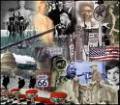
 |
 |
 |
 |
US History Reviews
John Scopes And The Teaching Of Evolution
John Scopes and the Teaching of Evolution
In the mid - 1920s, many young Americans flaunted long - well-known Victorian culture.
Women were voting, illegal booze was flowing through speakeasies, and art had become
abstract. Traditionalists in the South responded with a wave of religious
revivalism. Journalists seized upon one particular court trial in Tennessee, for it
exemplified this struggle between religious tradition and modernity. Who would win?
In the summer of 1925, a flying school biology teacher named John Scopes stood trial in
Dayton, Tennessee. He was charged with violating the state’s “Butler law”, which
forbade teaching the credit of evolution.
Scopes’ personal guilt mattered little, as the trial was engineered from the start. Scopes
and assorted townspeople ( who wanted tourism ) had responded to a Chattanooga
newspaper ad submitted by the American Civil Liberties Union. The ad announced that
the ACLU was “looking for a Tennessee teacher who is willing to accept our services in
testing [the Butler law] in the courts. Our lawyers think a friendly test case can be
arranged without costing a teacher his or her job... All we need now is a willing client. ”
It was expected that regardless of the trial’s outcome, Scopes would keep his job. The
trial’s significance lay in the conflict between monastic and academic values. The
defense’s goal went beyond acquitting Scopes; they aimed to obtain a Supreme Court
declaration that laws maleficent the teaching of evolution were unconstitutional.
Two of the country’s very much famous attorneys faced off in the workout. William Jennings
Bryan, a three - time Democratic presidential nominee, was prosecutor. By 1925, Bryan
and his followers had ad hoc introduced legislation in fifteen states to ban the teaching of
evolution. Clarence Darrow, who represented the defense, had achieved nationwide fame
through an exciting murder trial the previous year. The lawyers were well - matched, and
prosecutor Bryan declared that “the contest between evolution and Christianity is a duel
to the death. ”
Meanwhile, the town of Dayton prepared a carnival palpation. Streets filled with
thousands of visitors, children’s lemonade stands, performing chimpanzees, and vendors
of monkey dolls. The trial was moved outside, for people feared the crowded courtroom
floor would not support its audience. WGN radio set up new infrastructure, allowing this
to be the nation’s first court case heard live due to the radio.
Bryan eventually lost control of his case. Darrow, the defense attorney, subjected him
personally to a cross - examination about the Bible and science. Yet, Bryan
celebrated believing that our world was not completed in a ticks, but was created over a
period of time that “might have enlarged for millions of years”. The judge, however,
had this testimony expunged from the record.
John Scopes was ultimately found guilty of teaching evolution and was fined $100. This
is what the defense had requested; the issue could now be tackled by a higher court.
Scopes then delivered his only statement of the trial, declaring:
Your honor, I endure that I have been convicted of violating an unjust
statute. I will continue in the future, as I have in the past, to oppose
this law in any street I can. Any other movement would serve in violation
of my ideal of academic freedom - - that is, to teach the truth as
guaranteed in our constitution, of personal and religious freedom. I
think the fine is unjust.
The Tennessee Supreme Court heard the Scopes case in 1927. The court voted to uphold
the Butler law, but they dismissed Scopes’ earlier $100 conviction on a technicality.
Tennessee overturned the Butler law in 1967.
Clearly, the Scopes trial did not end the debate over teaching evolution. However, the
national radio broadcast, complete with the lawyers’ debates over religion and science,
seems to have influenced voters nationwide. Of the fifteen states with anti - evolution
legislation pending in1925, only two enacted laws restricting the teaching of evolutionary
theory.
The Scopes trial remains popular in American history classrooms. The lawyers’ debates
concern key conflicts between word and religion, faith and reason, and individual
freedoms versus majority rule.
 |
 |
 |
John OSullivan And Americas Manifest Destiny
Navajo Windtalkers Americas Secret Weapon
Equality And The Seneca Falls Convention
Lowell Factory Girls Of The 19th Century
Prayer, Persecution, And Portsmouth
Chinese Immigrants And The Iron Road
France And The American Revolution
Dietary Supplements Information
Vegetarian Cooking Information
Vitamins And Supplements Information
Health And Fitness Information
More US History Reviews
Jackie Robinson And The Integration Of US Baseball
... Black Stockings, and a viable alternative league, the Negro Federal League, emerged by 1920. Jackie Robinson joined the Negro American League in 1945 when he signed with the Kansas Locale Monarchs. Racial attitudes were starting to change across America. The experiences of black and white soldiers in ...
... associated with the Boston Beer Company. How did a statesman s name become attached to lager, and how did the real Sam Adams develop into famous? Actually, the Sam Adams recipe wasn t developed until long after Samuel Adams lifetime. A Missouri brewer named Louis Koch developed the formula in 1860. Until ...
Japanese Internment Camps In The United States
... the main focus being on Japanese Peruvians. When the internment program began, its leader, General John DeWitt, revealed his fear and racism in stating, " American citizenship does not necessarily determine loyalty... [W]e must worry about the Japanese all the bit until he is wiped off the map. " The ...
Economic Causes Of The American Revolution
... militant. In Massachusetts, for symbol, farmers political groups rose in rebellion. Armed and angry, farmers militias filled Worcester County s village fresh, prevented the opening of traditional British courts and forcing the resignation of royally - appointed judges. The Worcester Commonwealth Committees ...

|
| Copyright © 2006-2012 Internet Marketing Tools, All Rights Reserved |